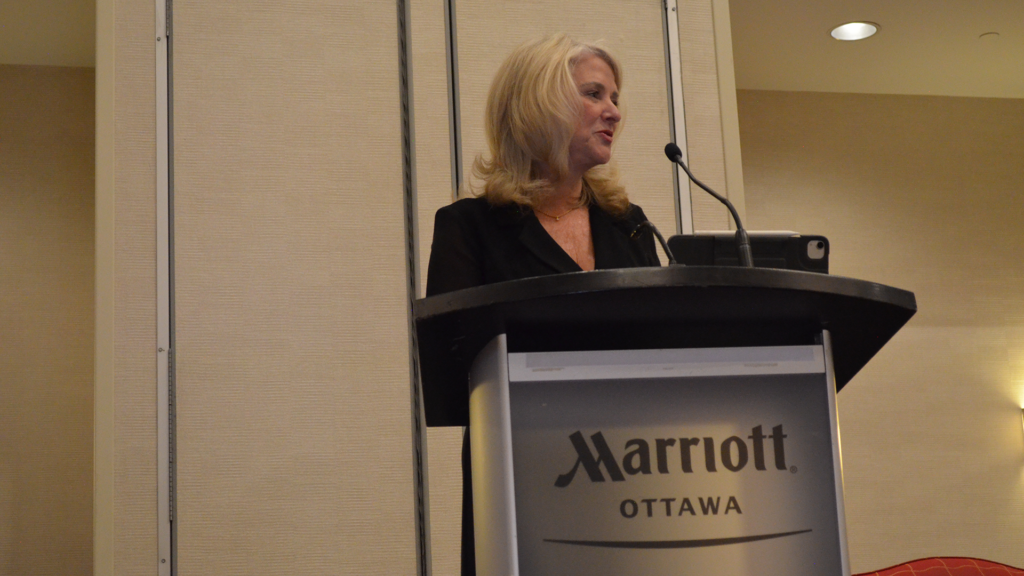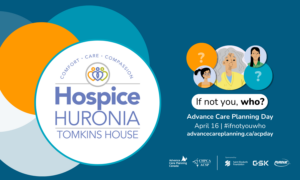On October 12, 2023, at the CHPCA Conference in Ottawa, Nancy Lefebre, Senior Vice President and Chief Operating Officer of Saint Elizabeth Health, received the CHPCA Award of Excellence in recognition for her contributions to increasing the accessibility of palliative care in Canada.
Born and raised in Alberta, Nancy Lefebre moved to Toronto with her family, and after high school, enrolled in nursing school. Upon graduation, she found that there were not many career opportunities for her in the area, and so moved to the United States, landing a job at the UCLA Medical Center. Returning to Canada after her stint in the US, Nancy began working as a nurse across the country, from Victoria, BC to Halifax, NS, before eventually settling down in Toronto once again, where she started at SE Health as a part-time visiting nurse in 1985.
“As a nurse I didn’t have a defined interest in palliative care – I thought it would be a really sad space actually,” recalls Nancy. “However, when I started working in home care, I saw the phenomenal impact that the graciousness and support of nurses and healthcare providers had on the lives of those going through a life-limiting illness. And it had an impact on me as a nurse as well – and set me on the path to learning a lot more about palliative care.”
And because of SE Health’s dedication to the personal and professional development of its staff, Nancy had the opportunity to pursue continuing education, eventually earning a master’s of nursing science and allowing her to transition into a management role.
From her experience as a nurse, she gained an intimate understanding of the knowledge needed to perform the role well, as well as the tools and support nurses need to succeed – all of which benefited her greatly in her new role.
“I saw firsthand how care is only about 20% physical care or pain management – the other 80% is about supporting the individual, being with them, and helping them live,” says Nancy. “We ensure all of our staff are comfortable communicating with patients, their families, and primary care physicians for that reason – so that everyone feels supported at all times.”
As Nancy worked her way from management to executive-level leadership at SE Health, she eventually moved into the role of director of business development, where she began working closely with the Saint Elizabeth Foundation, the philanthropic arm of Saint Elizabeth Health responsible for supporting programs and initiatives across the country with funding, as well as initiating many programs of their own. On such program was to be a brand-new hospice in Toronto.
“We were trying to find a project, a focus for our foundation and decided to leverage our 30 years of experience in end-of-life care and develop our own hospice,” remembers Nancy. “We were passionate about the field, had invested in the infrastructure before, and were acutely aware that not every Canadian had access to quality palliative care – it felt like that perfect project to undertake.”
Nancy and the Saint Elizabeth Foundation did not just leap in to establishing a brand-new hospice residence headfirst however – an extensive learning process was undertaken to ensure any program the Foundation invested was sustainable and impactful.
“When you work under the same CEO for as long as I worked under Shirlee Sharkey, the CEO at the time, you develop a very trusting relationship and are encouraged to follow your intuition and take risks,” says Nancy. “That being said, there was, and still is, always an emphasis placed on talking to people and communities, identifying gaps, and consulting the professionals who are actively working and innovating in the space. So that’s what I did.”
Over a period of six months, Nancy travelled across Canada and developed relationships with the volunteers, practitioners and organizations working in hospice palliative care throughout the country, identifying gaps that needed filling. Building on her learnings, the Saint Elizabeth Foundation provided grants to many of these areas – contributing funds to help with operations, supporting the development of grief and bereavement programs, and providing catalyst funding to expand outreach.
It was after visiting multiple hospices across Canada and see the care they provided to patients that became the inspiration for the Foundation’s flagship project, Journey Home Hospice, struck Nancy.
“We have been talking about how Canadians prefer dying in comfort at home with their loved ones around them for close to 15 years – but what about all the Canadians who don’t have a home to go to? Where do they go to die?” recalls Nancy.
Launched in 2018, Journey Home Hospice in Toronto is a 10-bed hospice residence, with the additional of three chronic hospice beds for longer stays, serving patients experiencing homelessness and structural vulnerability and provides patients with high quality health care services and a safe, welcoming, caring environment for their end-of-life journey. The program offers a research data-driven, trauma-informed, culturally safe, and harm-reducing specialized approach to care that meets patients where they are at as individuals and tailors care plans to meet their life goals.
Although clearly a success in its current form hosted by the Homes First Society, Journey Home Hospice was initially envisioned to be a 10-bed hospice residence at its own, newly built location. It would have taken over a year to get the funding together to begin construction on a new building. So, recognizing the dire situation so many people experiencing homelessness in conjunction with a life-limiting illness are in, Nancy decided something needed to be done immediately.
“We talked to the Homes First Society and came up with a plan to have them host four beds, pulled together the money, renovated the space and got it up and running in three months,” remembers Nancy. “The parliamentary assistant to the Minister of Health and Long-Term Care at the tame, John Fraser, was a huge help. Despite not being able to help with funding, he helped immensely by connecting us to the Ministry for support in sourcing supplies and equipment.”
And this abrupt beginning and the smaller scale of the initial project ended up being a blessing in disguise.
“It wasn’t easy, and we learned a lot during that initial period – we got the right staff and leadership in place and learned about the unique needs of the population. We had heard from colleagues in the space how challenging this would be, and they were absolutely correct,” says Nancy. “Because we started small, it made it quite a bit easier to scale up with confidence.”
Almost immediately, the impact that Journey Home Hospice was having on the community was felt.
“There was one person, her name was Nicole, who was a soccer mom. One day she was taking her kids to practice and then the next thing she knows she’s addicted to Oxycontin, living on the streets, her children are taken away from her and she’s dying,” recalls Nancy. “It could happen to anyone, and sometimes it’s out of our control. Although her stay with us was short, we were able to provide her with care, security, and warmth – a home.”
Eventually the necessary funding came through, Journey Home Hospice expanded from four to 10 beds, and then expanded again to thirteen beds in 2021, and the vision of a compassionate, supportive hospice for those experiencing homelessness in Toronto continues to grow. However, with homelessness a growing and pressing issue throughout the country, Nancy and the Saint Elizabeth Foundation were not content with just one location – they wanted to share what they had learned and help tackle the issue wherever they could.
“We opened our satellite location with three beds in Windsor in November 2022, once again with the invaluable support of a community partner, Assisted Living of Southwestern Ontario,” says Nancy. “Along with solid partnerships, the key piece is finding the right people who can work within that environment and with that population, who also have a good understanding of hospice palliative care.”
And while Nancy and SE Health are providing access to palliative care to people experiencing homelessness with the Journey Home Hospice project, they have also been hard at work ensuring other vulnerable communities in Canada have those same opportunities, such as the remote Indigenous communities living in the northern reaches of the country.
“Again, it’s all about access. Two thirds of northern residents must travel more than 90km just to see a physician, never mind get access to quality, specialty care,” says Nancy. “And we’ve worked very hard to build trust with those communities, supporting them, and letting them lead the way and guide the programs.”
This supportive approach, built on trust and respect, is not just a method of engaging a community – it’s emblematic of the broader philosophical approach of the organization, and of palliative care in general. “When we provide care, we’re not going into people’s homes and taking over,” says Nancy. “We listen, learn, support, and work together to achieve their goals.”
And going forward, Nancy hopes to see even more populations gain access to hospice palliative care. “All Canadians need to be able to access palliative care,” asserts Nancy. “Whether you live in a rural, remote or indigenous community, live with a developmental or physical disability, are a new Canadian or refugee, or are incarcerated – everyone should have access to the care they need, when they need it.”
Congratulations to Nancy for her well-deserved award. As she continues her work at SE Health as Senior Vice-President, COO, she continues to be a force for change in Canada’s hospice palliative care landscape.
To find out more about the work of the Saint Elizabeth Foundation and Journey Home Hospice, visit foundation.sehc.com.






